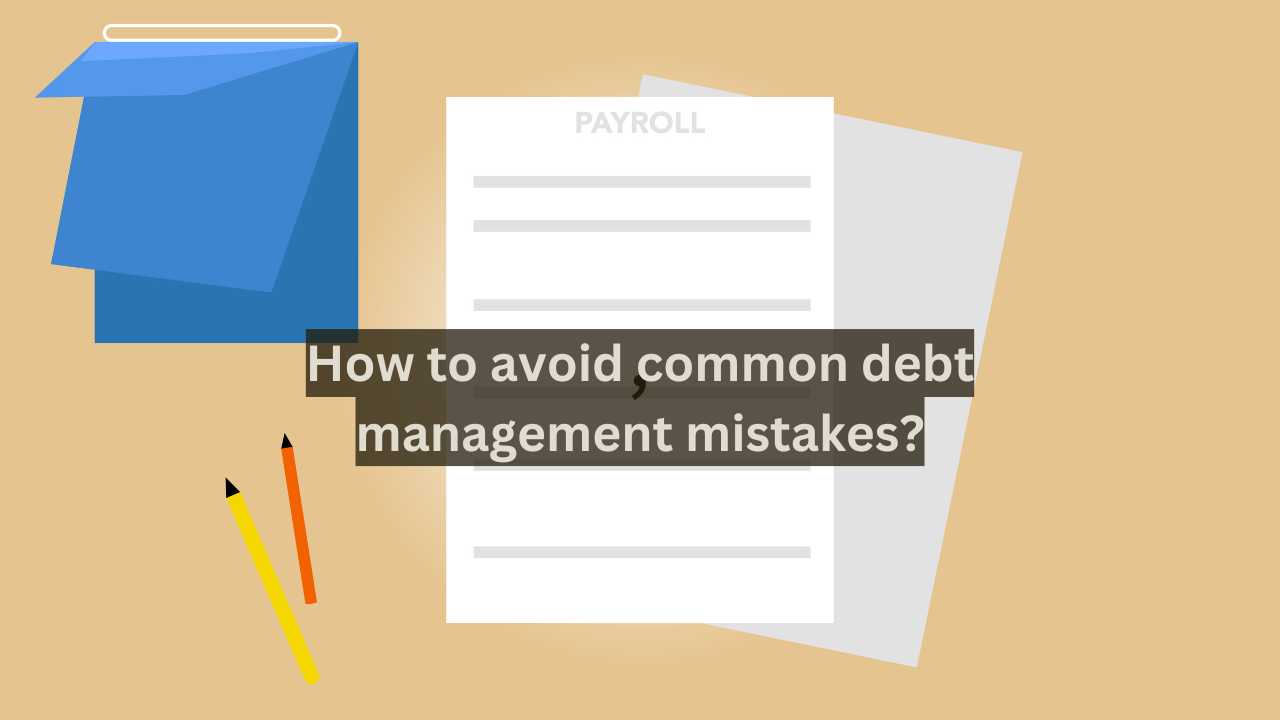Effective debt management is crucial for maintaining financial stability and achieving your financial goals. However, many people make mistakes that can hinder their progress and increase their debt burden. Here’s a guide on how to avoid common debt management mistakes and stay on track with your financial goals.
1. Failing to Create a Budget
One of the most common mistakes in debt management is not having a budget.
- Create a detailed budget: List all sources of income and categorize your expenses. Include essential expenses such as housing, utilities, groceries, and debt payments.
- Track your spending: Use budgeting tools or apps to monitor your spending and ensure you stay within your budget.
A budget helps you manage your finances effectively and allocate funds toward debt repayment.
2. Ignoring the Impact of Interest Rates
Neglecting to consider interest rates can lead to increased debt over time.
- Understand your interest rates: Review the interest rates on your debts and prioritize paying off high-interest debt first.
- Consider consolidating debt: Look into options like balance transfers or consolidation loans to reduce your interest rates and save on interest payments.
Managing interest rates effectively can help reduce the overall cost of your debt.
3. Making Only Minimum Payments
Paying only the minimum amount due can prolong debt repayment and increase interest costs.
- Pay more than the minimum: Whenever possible, make payments above the minimum amount. This accelerates debt repayment and reduces interest charges.
- Focus on high-interest debt: Allocate extra funds toward high-interest debts to reduce the overall interest cost.
Paying more than the minimum helps you pay off debt faster and saves money on interest.
4. Neglecting to Build an Emergency Fund
Without an emergency fund, unexpected expenses can lead to new debt.
- Establish an emergency fund: Save a small amount each month until you build a fund to cover unexpected expenses. Aim for at least $500 to $1,000 initially.
- Use the fund wisely: Use your emergency fund only for genuine emergencies to avoid disrupting your debt repayment plan.
An emergency fund provides financial security and prevents the need to incur additional debt.
5. Accumulating New Debt
Continuing to accumulate new debt while managing existing debt can derail your progress.
- Avoid unnecessary purchases: Use cash or a debit card for purchases to avoid adding to your credit card balances.
- Review your spending habits: Identify areas where you can cut back and redirect those funds toward debt repayment.
Preventing new debt helps you stay focused on paying off existing debt and achieving financial stability.
6. Neglecting to Review Credit Reports
Failing to review your credit reports can lead to missed errors and affect your debt management.
- Obtain your credit reports: Request a copy of your credit report from each of the three major credit bureaus (Experian, Equifax, and TransUnion) at least once a year.
- Check for errors: Review your credit report for inaccuracies or outdated information and dispute any errors you find.
Regularly reviewing your credit reports ensures accuracy and helps you address any issues that could affect your credit.
7. Overlooking the Importance of Communication with Creditors
Avoiding communication with creditors can lead to missed payments and damage your credit score.
- Communicate proactively: Contact your creditors if you’re struggling to make payments. They may offer options such as payment plans or temporary relief.
- Keep records: Document all communication with creditors and keep records of any agreements or payment arrangements.
Effective communication with creditors can provide relief and prevent negative impacts on your credit score.
8. Focusing Solely on One Debt at a Time
While it’s important to prioritize, focusing only on one debt can lead to neglecting others.
- Use a balanced approach: Prioritize paying off high-interest debts but continue making minimum payments on other debts to avoid late fees and damage to your credit score.
- Consider the snowball or avalanche method: Implement strategies like the debt snowball (paying off smallest debts first) or debt avalanche (focusing on highest interest rates) to manage multiple debts effectively.
A balanced approach ensures that you address all your debts while making progress on the ones that matter most.
9. Ignoring Financial Education
Lack of financial knowledge can lead to poor debt management decisions.
- Educate yourself: Learn about personal finance, debt management strategies, and credit scores. Utilize resources like books, online courses, or financial blogs.
- Seek professional advice: Consult financial advisors or credit counselors for guidance and support.
Improving your financial literacy helps you make informed decisions and avoid common debt management pitfalls.
10. Failing to Set Clear Goals
Without clear goals, it’s challenging to measure progress and stay motivated.
- Define specific goals: Set realistic, measurable goals for debt repayment, such as paying off a certain amount within a specific timeframe.
- Track progress: Regularly monitor your progress toward these goals and adjust your plan as needed.
Setting and tracking clear goals provides direction and motivation for managing and reducing your debt.
Conclusion
Avoiding common debt management mistakes is crucial for achieving financial stability and successfully reducing debt. By creating a budget, understanding interest rates, making more than minimum payments, building an emergency fund, and avoiding new debt, you can manage your debt more effectively. Regularly reviewing credit reports, communicating with creditors, using a balanced approach to debt repayment, and seeking financial education further enhance your debt management efforts. Setting clear goals and tracking your progress ensures that you stay on track and make steady progress toward becoming debt-free.
FAQ
1. What should I do if I realize I’ve been making common debt management mistakes?
Assess your current debt management strategy, identify the mistakes you’ve been making, and develop a plan to correct them. Consider seeking professional advice if needed to improve your approach.
2. How can I prevent accumulating new debt while managing existing debt?
Avoid using credit cards for unnecessary purchases, review your spending habits, and create a budget to ensure that you live within your means. Focus on using cash or a debit card for transactions.
3. What are the benefits of setting clear debt repayment goals?
Clear debt repayment goals provide direction, motivation, and a framework for your debt management strategy. They help you measure progress, stay focused, and make informed decisions about your finances.
4. How often should I review my credit reports?
Review your credit reports at least once a year from each of the three major credit bureaus (Experian, Equifax, and TransUnion). Regular reviews help you identify and address any inaccuracies or issues affecting your credit.
5. What should I do if I can’t make a debt payment?
Contact your creditor as soon as possible to discuss your situation. They may offer options such as payment plans or temporary relief. Keep records of any agreements and maintain open communication with your creditor


